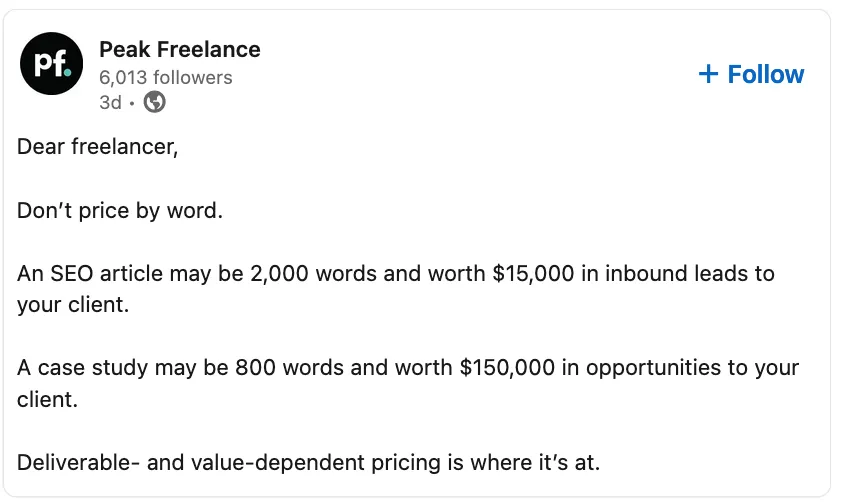Understand value to price your time or services
At least three to four times a week now, I see advice shared that loosely says “don’t charge for time, charge for VALUE”. And this is good intentioned, and some people need to hear this advice, but I think it’s over done now and needs some more context to be, uh, valuable to its target audience.

I can see why it’s popular and often gets widely shared - the target audience (programmer, writer, designer, etc) likes to hear that they can create $150k value in a few hours, and many people do under-value their time. If you’re selling your services at $10/hour and putting in a bunch of extra unpaid hours, and your employer would happily pay you more, then you should capture that.
But it’s still important to stay grounded in reality (unless you’re ok with massive disappointment after you’ve already checked out luxury housing your area and then realized that no one is going to pay you $150k for an 800 word case study).
How to think about the value you create
I think there are two fundamental flaws in how most of this advice is given.
-
You’re not the entire value chain, even if you’re close to the end. In the examples above, an SEO article that brings in $15000 worth of in-bound leads is still worth a lot less than $15000.
-
No matter how much value you create, you’re probably operating in some kind of free market, so if someone else will create that value for less than you, you’re not going to get hired.
You’re not creating all of the value
In the examples above, you’ll probably find many people claiming that they ‘generated the value’. The sales team who closed the deals, the marketing team who set up the site and processes, the founding team who set up the original company, the engineer who optimized the frontend of the CMS, etc etc etc. Many of those people are going to claim “Created $XXX,XXX,XXX of value” on their CVs when they move on to new jobs. If you add them all together, you’ll get to an obviously ridiculous number that is far from the truth.
I’ve worked in teams where every person, team, or department thought that they were creating all the value, and the others were just doing grunt work that could easily be done by anyone. This isn’t a healthy way to collaborate.
Markets are fairly efficient
Markets are not perfectly efficient, so if you understand value then it’s easy to capture more of it, even if someone else could do as good a job cheaper. Maybe your employer or clients trust you more, maybe you have the right connections, maybe it’s just that you have the right payment and tax infrastructure in place to make it easy to do business with you. Life’s not fair, and you don’t have to ‘race to the bottom’ to compete for work.
But there are limits. The person approving your budget is not going to be thinking “wow here’s a $150k opportunity, if someone could just help me unlock it then I’ll give them half”. Or maybe they are, but then they’re looking for a cofounder to take a high risk on an unproven idea.
They’re thinking “I need someone to do x, and my understanding is that I can get x done for about $y/hour, and I think this project will take 10-20 hours”. Or maybe they’re thinking in terms of annual budgets and full time employees, but they’re certainly not thinking “how can I fairly distribute the value I’m going to create here as widely as possible”.
I’ve seen similar thinking in advice about how to price SaaS applications that have 99% profit margins. Yes, you might be creating huge value, but if someone else can do the same for less, you’re going to lose customers.
So should you just go back to pricing by hour?
Not necessarily. Understanding the value you create and how you create it makes you more valuable to the people who want to hire you. They don’t have to explain tradeoffs to you, define the tasks very carefully, and set boundries if you already have a good understanding of what value you’re creating and where the money is coming from. If you can price competitively in another structure and you think it’s better for you, then go for it.
But understanding value also means understanding how your clients are thinking about costs. Just saying “I create value so pay me more” is a good first step to finding your own worth if you’ve been chronically undervalued or underpaid for years, but it’s far too simplisitic of a view past that initial recalibration period.